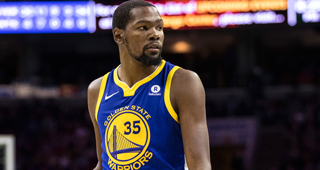Neurotic behavior is on the rise in the NBA. In the era of every-physical-object-is-actually-a-camera-and-also-a-screen, replay culture has reached yet another peak, with the league encouraging its rise by way of its regular two-minute report. This summary of retrospectively missed calls has played a role in the crescendo of tension between players, referees, and fans about what constitutes fair play—a crescendo that owes most of all, to be sure, to modern technology in general. The industry of overthinking that non-stop video analysis breeds has found higher form, most recently, in an increasingly explicit emotional war between players and referees.
“I’m done with the refs,” said Carmelo Anthony, after Oklahoma City Thunder teammate Russell Westbrook was ejected in the late phases of a January 15 win over the Kings. “No disrespect, but I’m done with those guys,” he went on, inspiring imaginations of Anthony literally disregarding the hired agents of order on the court, playing through whistles he disagrees with.
Kevin Durant, more recently, accused referee James Williams of personally targeting him for an ejection during a win over the New York Knicks.
“His whole thing was like he’s trying to get me,” Durant said. He went on to suggest that Williams would “still be in his feelings” when his Golden State Warriors next see him on the sidelines, and that “this is a bad season for us and the refs, as far as our relationships are concerned.”
Constant surveillance leads to constant paranoia, and deifying technological hindsight by taking power away from human referees and deferring it to the eyes of machines in crucial minutes—this creates an environment of revisionism and hair-splitting that can inevitably lead to only a more impossible circumstances for officiating. Perfect officiating is unattainable—the only true perfection referees can strive for is in consistency—because of how large, fast, and multi-faceted the game and the rulebook are. The more we are able to scrutinize referees, the larger our inventory of their flaws will become, and the messiness of human emotion that results will cause a frustration and skepticism that become pathological. A gross feedback loop, which is already forming, will continue to form and only take us further from a foundation of fairness. The player rhetoric will only grow, and, one way or another, have undue impact on officiating.
The NFL, a mega-entertainment product that draws more viewers than the NBA but is nonetheless undergoing a drastic swoon in attention, should stand as a cautionary tale. With its much more advanced system of play review incorporated into officiating, the sport has inspired more “what constitutes a catch” debates at bars with each passing season. These conversations are dull, pointless exercises of logistics that are usually defined by emotional bias but masked in a sheen of “logic.” It is harder, with each NFL season, to distinguish between the way the sport is and the way it would be if, instead, each team sent a lawyer to mid-field to hash out a winner by way of dry debate.
The NBA is far from this moment, and as always, it comes to its officiating crossroads with a fuller humanity than its pigskinned counterpart; it is kind of funny, this widening rift. How far can it go? Many people who did not know James Williams’ name yesterday know it today, and now it will be another page in the extending saga of Kevin Durant’s inexplicable saga of saltiness, his unquenchable thirst of a first-time champion. But that the presence of referees is moving away from a general perception of neutrality, instead of toward one: this is never good. It is never good for sports when their audience spends vast time considering the pedantry that holds them together, distracting viewers from the grace and drama they are made to embody.
The solution is probably an impossible measure: moving backwards. Anachronism almost never takes within juggernauts of mass media, and one shouldn’t expect it to in the NBA, either. But a divestment of review-based officiating, and an acceptance of the flaws inherent to the effort of taxonomizing some of the most overwhelming, most imaginative human movement on the planet—this would be for the best. Walls should not be built between the game being played and the game not being played. If the recent wave of superstar opining is toward an abundance of whistles blown, then it is justified—what, really, should stop a basketball game from proceeding? This question ought to have few answers. Let them run, let them talk, even let them hit each other a little, because that is bound to happen. The correlation between innovation and reason is fraught at its very best, and the NBA can be calm enough in its vision to avoid the temptation of a false technological progress that takes us to needless panic.



